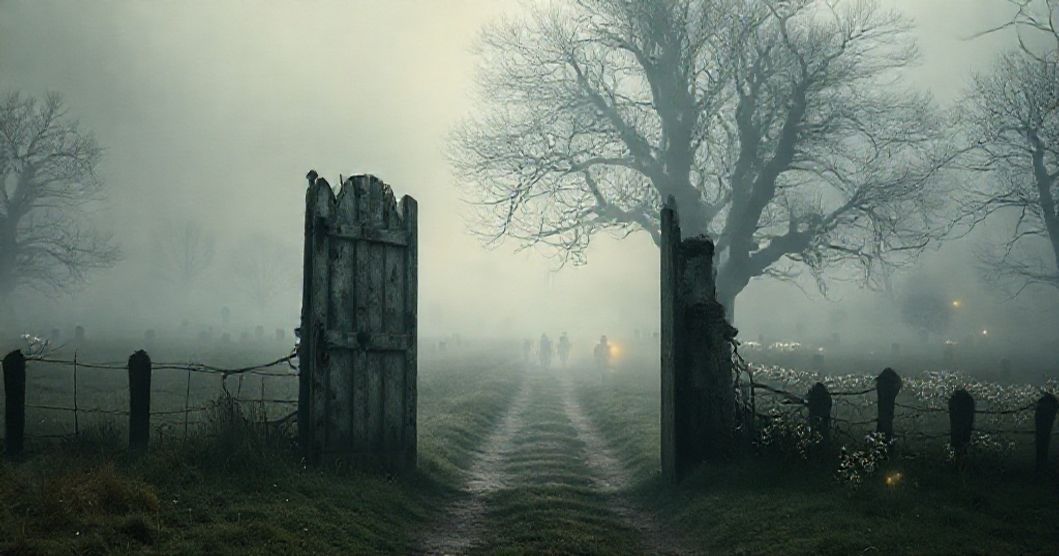Core Symbols: The Cemetery, Doorways, and Echoes
Cemeteries in dreams are rarely literal tombs but symbolic thresholds between the present and the past, memory and mortality. The act of standing at a cemetery gate or pushing through a weathered doorway isn’t just about entering a graveyard—it’s about crossing into emotional territory you’ve left behind. The door itself is a powerful symbol of transition: some cultures view doorways as liminal spaces where the living and dead coexist, while others see them as metaphors for unacknowledged truths. When you chase echoes beyond these doorways, you’re not pursuing a physical destination but a spectral reminder of something unresolved.
Echoes, unlike tangible figures, carry the weight of emotion without clarity. They might feel like half-remembered conversations, unspoken regrets, or faded laughter that refuses to stay buried. In dreams, these echoes often appear as indistinct shapes or voices, refusing to be fully seen or understood—a mirror of how your subconscious processes emotions it can’t yet articulate. Together, the cemetery’s stillness, the doorway’s threshold, and the echo’s pursuit create a scene of quiet urgency: your mind is asking, What have I left unsaid?
Psychology Lens: Unconscious Processing and Emotional Closure
Want a More Personalized Interpretation?
Get your own AI-powered dream analysis tailored specifically to your dream
🔮Try Dream Analysis FreeFrom a psychoanalytic perspective, Sigmund Freud might interpret these dreams as repressed memories clawing to the surface—unfinished business with people, places, or versions of yourself you’ve outgrown. Carl Jung, however, would frame the cemetery as a symbol of the collective unconscious, where ancestral or universal themes of mortality and legacy reside. The door, in this view, becomes a portal to your shadow self—the parts of you that feel buried but still influence your daily life.
Neuroscience adds another layer: during REM sleep, the brain’s amygdala (emotional processing center) activates more intensely, helping consolidate emotional memories. Chasing echoes in dreams could be your brain’s way of replaying and integrating these memories, much like a therapist reviewing old cases to find patterns. This isn’t just about the past—it’s about your present self learning to carry unresolved emotions with more clarity.
Life Triggers: When the Subconscious Calls You Back
These dreams rarely appear randomly; they’re often triggered by life transitions that force you to confront what you’ve left behind. A recent move, the end of a relationship, or the loss of a role (like a job or identity) can open the subconscious floodgates. For example, someone who’s spent years avoiding their hometown might dream of a cemetery there, the doorway symbolizing the courage to revisit old wounds. Similarly, a person grieving a loss might chase echoes as a way to keep the memory alive without being overwhelmed by it.
Modern life amplifies this: social media’s curated pasts, career pressures to “move forward,” and the constant noise of productivity can make it easy to ignore the quiet pull of unfinished business. Your subconscious, ever the archivist, might stage a cemetery doorway dream to remind you: You can’t truly move forward until you’ve acknowledged what’s behind you.
What To Do Next: Turning Echoes Into Closure
Start by documenting the dream’s details: What did the cemetery look like? Was the doorway open or closed? How did the echoes feel—familiar, threatening, or nostalgic? Journaling these specifics helps your conscious mind connect with the emotional undercurrent. Ask yourself: What relationship, regret, or identity feels “buried” in my life right now? This reflection is the first step toward closure.
Medium-term, experiment with creative expression. Paint the echoes, write a letter to the “unfinished” part of yourself, or visit a physical cemetery (if safe and comforting) to walk its paths. These acts externalize the internal chase, turning abstract dreams into tangible action. If the dream recurs, notice if the doorway opens or closes—this might signal whether you’re ready to face the issue or still avoiding it.
Long-term, integrate this awareness into daily life. Practice mindfulness to distinguish between productive reflection and rumination. If the echoes feel tied to a specific person, consider a heartfelt conversation (even if it’s with a memory) to release emotional weight. Remember: the goal isn’t to “fix” the past but to honor it, so it no longer haunts your present.
FAQ
Q: What does it mean if the echoes feel threatening in the dream? A: Threatening echoes often reflect fear of vulnerability or the unknown, but they’re also your subconscious urging you to face something you’ve avoided. It’s not a warning—it’s a nudge to process emotions you’ve numbed.
Q: Is this a sign of impending loss? A: No. Cemetery dreams are about processing existing losses or unprocessed emotions, not predicting new ones. They’re invitations to honor what’s already been lost, not fear future departures.
Q: How do I tell if the echoes represent a specific person? A: Notice the emotional tone: warmth might signal a loved one you miss, coldness could point to a regretful interaction. Dreams rarely name names directly—they use feelings to guide you.
